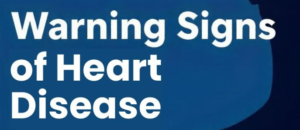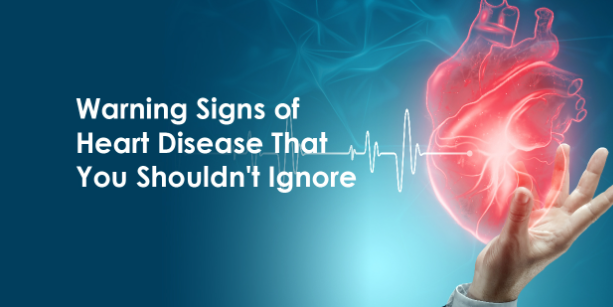Top Signs of Heart Disease You Should Not Ignore
Heart disease is colloquially called the ‘silent killer,’ as many people might suffer from symptoms without bearing in mind the gravity of the situation. The World Health Organization reports that cardiovascular ailments are the number one cause of death worldwide, claiming around 17.9 million lives every year. Spotting such signs early on can be critical in avoiding more serious complications and improving the results. This article will discuss the top signs of heart disease you should not ignore symptoms of and how you can take steps towards prevention of such issues. Significance of the symptoms will also be discussed in detail along with the steps which can be taken to prevent any such issues in future.

Key Features of Top Signs of Heart Disease You Shouldn’t Ignore
Of the various features that accompany heart diseases, knowing the three main characteristics of a more common disease will help you detect red flags earlier. These are some of the most prevalent symptoms which in general can mean associated heart diseases: Chest Pain or Discomfort.
This is usually experienced as pressure, a “squeezing” sensation, or sharp – or dull – pain in the center or on the left side of the chest.
- It may persist for several minutes or more or can come and go.
- Sob May occur alone or together with chest discomfort.
- Might point toward Hearth Failure and other cardiovascular concerns.
Fatigue
- Uncharacteristic or [shifting extreme] intensity of fatigue especially in women, is said to be one of the earliest cardiac warning signs patients may notice.
- This fatigue may even be non physical and remain for several days.
Palpitations
An abnormal awareness of the heart or feeling of thumping, racing, or pounding sounds in heart beat.
- This may suggest an arrhythmia or an irregular beat.
- Swelling in the Legs, Ankles or Feet
- Above normal fluid retention in these parts may indicate a heart failure.
- Swelling may also be seen with other complainants such as dyspnea.
- Lightheadedness or Dizziness
- Unexpected dizziness or even feeling light headed can be a possible sign of having heart problems.
- It can also suggest a decrease in blood circulation secondary to cardiovascular disease.
- Jaw, Neck or Back Pain
- Pain is often referred to Jaw, neck, and back especially in women.
- This pain can be present with other symptoms of heart ailment.
- Cold Sweat or Nausea
- Cold sweats, nausea, and even vomiting may be present when a patient has a heart attack.
- Women may have these symptoms more in number.
It is important to appreciate these symptoms and their importance if they are to go for medical assistance as soon as possible which can make a difference and save lives.
Specialty of Top Signs of Heart Disease You Shouldn’t Ignore
The specialty of assessing the signs of heart disease one understands very well that the symptoms are not uniform in all. There are variation in the manifestations of heart disease such as due to sex, age or other risk factors.
Opposite Sexes: Most women will read different symptoms from men’s classic chest pain. Whereas while men can almost develop typical warning signs like heart attack, women can shows signs like tiredness, dizziness, difficult in taking deep breath & nausea.
Age Factor: More aged individuals tend to metabolize more defeat their signs of the heart problems and tend to confuse fatigue or hazed thoughts with just old age instead of heart problem as such.
Risk factors: Family history of heart disease and diabetes, hypertension as well as high cholesterol patients must be more careful in recognition of the signs.
Knowing these details brings it out in the open that heads seeking issues regarding heart problems are more prevalent due to potential of mild nature of symptoms associated with it.
Uses of Top Signs of Heart Disease You Shouldn’t Ignore
Identifying the top signs of heart disease comes with several advantages as listed below:
Early detection: Once the early signs of symptoms are properly recognized, that can help in taking timely action of getting medical attention which can prevent the patient from severe consequences or getting admitted in the hospital.
Making Informed Choices: Patients who are aware and comprehend their symptoms can articulate their issues to healthcare providers and obtain appropriate diagnoses and managements.
Preventive Measures: Patients at risk of heart disease who are aware of the signs may desire to change their lifestyle and diet, become more physically active and quit smoking which lowers the risk factors.
Self Efficacy: The desire to learn heart disease signs enables the individuals to be responsible for their health by taking a better perspective towards health.
If people fully appreciate these symptoms, such as breathlessness and other risk factors, they can make better decisions about their health and well-being.
Main Theme of Top Signs of Heart Disease You Should Not Ignore
Understanding the main symptoms begs the recognition of the top signs of heart disease learning, and teaching as important aspects in controlling the disease. Heart disease is mostly uncontrollable, poisoning a big part of the population and learning what are its symptoms can make all the difference in catching it early on. One cannot think of heart health without the rest of the body, reaching its full potential, and living as long as everyone wishes to.
The practice, from self-examination, to scheduled screenings and magistral intervention can blend and create a synergic effect to a deteriorating heart health. Knowing the signs will not only help to save lives but promote an advancement in living style that will guarantee a better standard of living.
Pros and Cons of Top Ignored Heart Disease Indicators
Pros Cons
Lives can be saved through early detection Symptomatology may be taken lightly as an ordinary occurrence
People become proactive in taking care of their health Some people may not bother to learn about the importance of the signs
Prevents relapse and incorporates behavioral changes Some people may ignore symptoms because of fear or denial of the problem
Facilitates an open and healthy dialogue with health care providers Lack of knowledge means such treatment will come after a lengthy period
Once people understand the advantages and disadvantages of recognizing heart disease symptoms, they will better internationalize their health journeys.
Conclusion: Top Signs of Heart Disease You Shouldn’t Ignore
In an effort to save their health as well as their lives, people must be nobody hearts disease especially the top signs of heart disease you shouldn’t ignore. In this regard, awareness of symptoms like chest pain, difficulties in breathing, weakness and the rest can encourage patients to receive medical attention and prevent dire outcomes.
The peculiarity of these signs is their heterogeneity within different cultures, therefore individual health literacy has a place. As we go about our daily activities, heart health must be emphasized as we hear our bodies and consult medical practitioners when required.
In the end, the purpose of the article draws attention to one of the greatest public health problems, the rise of cardiovascular disease, and the need for increased education and health awareness. Individuals that understand the signs of heart disease can make the necessary changes to improve their health so as to live longer and in better shape.
FAQs: Significant Heart Disease Symptoms You Must Know
1. What’s the most prevalent sign of heart disease?
There are several signs that include, chest pressure, increased effort for breathing, tiredness, snapping or racing of the heart, water retention mostly in legs or ankles and pain in areas like jaw or neck.
2. Would you say that heart disease symptoms show some dissimilarity in males and female patients?
Yes, females sometimes show different signs than men, they include: Weariness, nausea and discomfort in the neck and jaws but not chest.
3. If someone gets heart disease symptoms, what actions must that person take?
People who have any of these symptoms must visit a doctor immediately to be examined and diagnosed and explained the nature of their problem.
4. What can an individual do or avoid in order to reduce the chances of developing heart disease?
Yes, heart illnesses can be limited by observing good dietary practices, consistent physical activity, nonuse of cigarettes, stress control and regular check of the health status.
5. Can one be said to have heart disease even when there are no clinical symptoms?
Yes, some individuals may reveal heart disease symptoms with no notable symptoms, hence the importance of nature preventive ways like check-ups and screenings.
